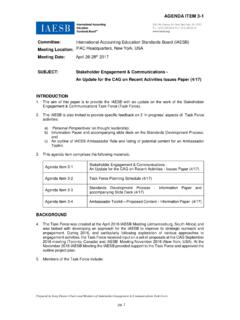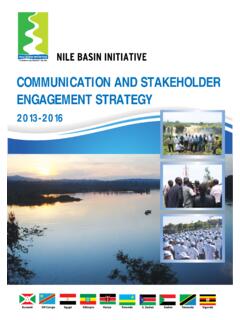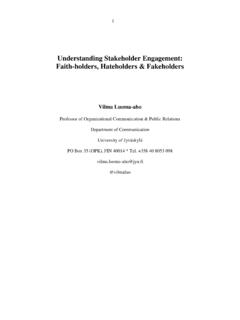Transcription of Developing a Model for Effective Stakeholder Engagement ...
1 1 Developing a Model for Effective Stakeholder Engagement management Marie-Louise Sinclair, Curtin University of Technology Abstract The maturing of corporate social performance as a management discipline has prompted a renewed interest in Stakeholder -related concepts of management and receptivity to approaches which embed Stakeholder Engagement in the business of business . The Stakeholder Engagement function has moved from nice to have to core business. This paper describes a five-year action research study to identify trends in corporate Stakeholder Engagement management and develop a Stakeholder Engagement management framework reflecting industry best practice.
2 Keywords: Stakeholder , Corporate social performance, Stakeholder Engagement , Ethical strategy, Systematic Engagement INTRODUCTION Over the past decade and more, Australian organisations have increasingly sought to respond to global trends by incorporating social sustainability and social performance principals into organisational management - grappling with these concepts and their practical implementation in the business environment. Associated with this focus on social performance, has been a burgeoning interest in Stakeholder -related concepts of management , together with a drive to enhance the strategic value of corporate communications functions such as Stakeholder Engagement , community consultation and social risk management - primarily to improve corporate responsiveness to the social environment.
3 Emergence of Stakeholder theories: According to Hitt, Freeman and Harrison (2001, ) the use of the term Stakeholder emerged in the 1960s from pioneering work at Stanford Research Institute, which argued that managers needed to understand the concerns of shareholders, employees, lenders and suppliers, in order to develop objectives that stakeholders could support . The term has become increasingly prevalent since Freeman s (1984) seminal text Strategic management : A Stakeholder Approach . While Freeman explicitly regarded the Stakeholder approach to be a strategic management tool - instrumental as opposed to normative - the emergence and establishment of a social performance agenda for business has highlighted the value of Stakeholder theory as a normative approach that some argue is more ethically and morally acceptable than a shareholder value approach (Cooper, 2004 p.)
4 3). 2 Instrumental versus normative: There is a great deal of discussion in the literature, relating to the tension between the instrumental versus the normative value of Stakeholder theory in management applications. For example, Greenwood (2006) takes issue with the assumption that Stakeholder Engagement and responsibility towards stakeholders necessarily converge. She points out that the difficulty of differentiating moral responsibility from calculated responsiveness has not been directly addressed in the literature (Greenwood, 2003, ). Indeed, some Stakeholder theories (notably Elaine Sternberg s Stakeholder entitlement theory) argue for a system of business ethics to overlay Stakeholder management mechanisms and for Stakeholder rights and entitlements that possibly go beyond exclusive service of the interests of the individual enterprise (and beyond maximisation of shareholder value).
5 There does appear to be consensus on the validity of Stakeholder theory as the most appropriate forum via which to address the question of whether ethics can co-exist with strategies designed to boost performance in highly competitive environments (Robertson, cited in Cennamo, Berrone and Comez-Mejia, 2009, p. 491). According to Cennama, Berrone and Comez-Meija (2010) [ Stakeholder theory] holds that a convergence between strategy and ethics is possible if the needs of a vast array of constituents are taken into account .. and a central question is how to balance the economic interests of the firm with the ethical and social concerns of stakeholders.
6 There are conflicting ideas in the Stakeholder and business ethics literature about the proper motivation, method and manner of engaging stakeholders, with the matter of power-equity and mutual trust in the organisation- Stakeholder relationship presenting as a major theme. Greenwood and van Buren (2010) have identified the construct of organisational trustworthiness as a possible solution to the problem of unfairness in organisation- Stakeholder relations on the basis that trust necessarily involves a moral component over and above any emotional or rational component ..[and that] trustworthiness is vital to the moral treatment of stakeholders (Greenwood and van Buren, 2010, ).
7 Since the mid 1990s, this question of the legitimacy of Stakeholder claims on organisations has emerged as central to the debate relating to corporate social responsiveness and corporate responsibility and constitutes a significant matter of interest for social responsibility theorists. The global meltdown of financial markets and widespread corporate collapses of 2008 re-focused public debate sharply on questions of the relationship between business and society and the design of the corporation of the future shifting the purpose of the firm to encompass not just shareholder needs but also societal, Stakeholder and ecological needs and interests (Waddock and McIntosh, 2002, ).
8 3 This discussion is however, somewhat beyond the scope of this study, which makes no claim for integrated Stakeholder management systems in regard to corporate social responsibility (CSR) - beyond their potential value as a platform for CSR activity and Stakeholder /community partnering based on a clear understanding of the perceptions of the identified stakeholders. The study does however, seek to identify the key principles for Effective Stakeholder identification, analysis and Engagement and to incorporate these principles into a management Model to formalise and embed the practice of Stakeholder Engagement within an organisation, within the context of public relations practice as a bridging, rather than buffering function focusing on the participation of publics in the organisation s strategic decision-making and behaviour (Grunig, 2007, p10).
9 Business benefits: The business benefits of Effective Engagement are now well-known and well-documented. A number of studies have found a clear correlation between Stakeholder relationship quality and financial performance (Waddock and Graves, 1997; and Svendsen, Boutelier, Abbott and Wheeler, 2001); sustainable wealth/long-term value (Post, Preston and Sachs, 2002) and corporate reputation (Dowling, 1994). Svendsen (1998, ) argues the case for competitive edge as an outcome of Effective Stakeholder Engagement : as paradoxical as it sounds, one way to succeed in a highly competitive globalised economy is to co-operate.
10 The central claims for an integrated approach to Stakeholder Engagement arguably centre primarily on benefits to the organisation essentially on the view that incorporating Stakeholder views in decision-making processes enhances organisational performance and commitment (Simmons, 2003, ). In this context, Hitt, Freeman and Harrison (2001, p. 191) point to the major post-1980s contributions made to Stakeholder theory by Ackoff and Churchman (1947), who applied a systems theory approach describing organisations as open systems and acknowledging their interdependence with external networks; and Katz and Kahn (1996) who developed organisational frameworks defining the organisation relative to the system around it.









